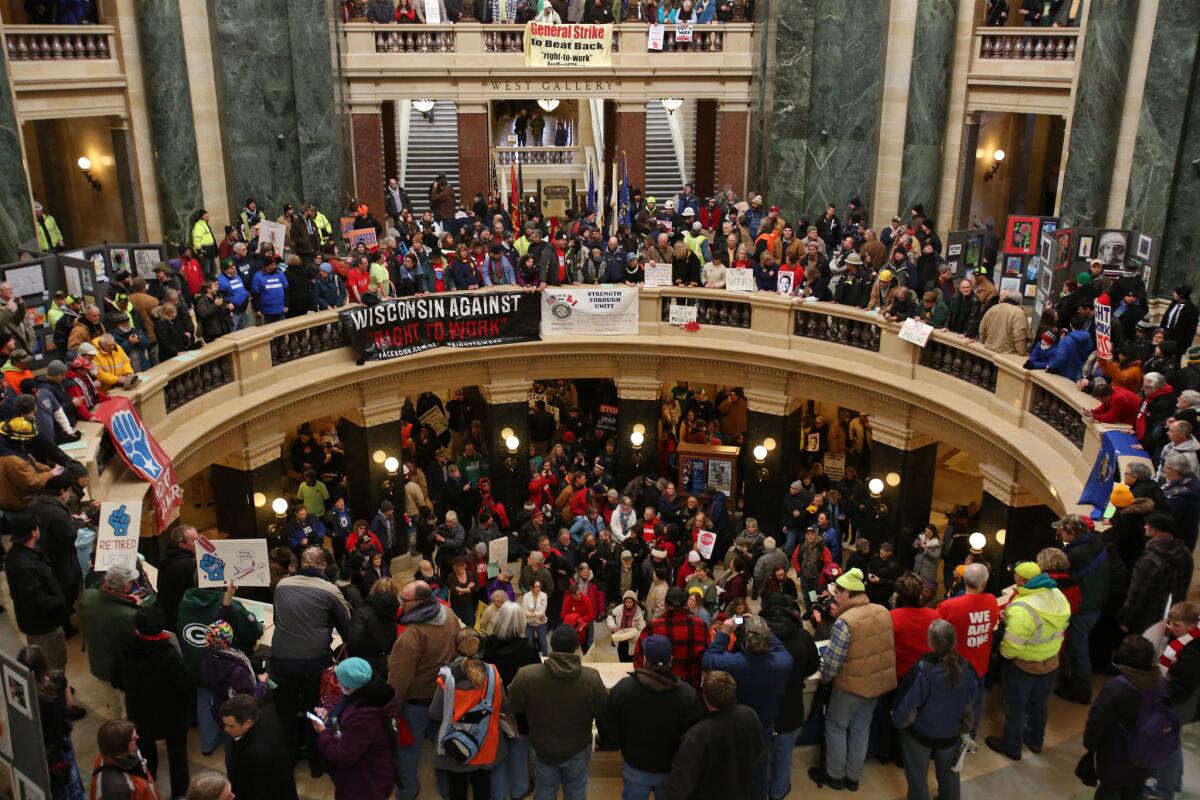Opinion: As Wisconsin goes, so goes the nation? Let’s hope not

- Share via
When Gov. Scott Walker signs the “right-to-work” bill moving through the Wisconsin state legislature, it will feel something like a tipping point. Wisconsin will become the 25th state to adopt such anti-union measures, which will mean that half the states will have barred requiring workers to pay dues to the unions that represent them in collective bargaining.
Remember it was Walker who four years ago pushed through laws that ended collective bargaining rights for public employees in Wisconsin. Now what once was the preserve of the anti-labor South has spread through the heartland. Even Michigan, home of the United Auto Workers and in many ways the path-breaker for blue-collar workers attaining a middle-class living, is now a right-to-work state.
A side note: These laws interfering with the relationship between workers and their employers epitomize government meddling in private commerce, usually the stuff that makes limited-government Republicans go apoplectic. Not so, apparently, when the meddling is aimed at undercutting collective bargaining. And Walker, who is eyeing a run for the White House, said in May 2012 that he would fight efforts to make Wisconsin a right-to-work state. Now? He says that he only meant in his first term, something, as the Milwaukee Journal-Sentinel points out, “he didn’t make explicit at the time.” So even before Walker’s fully in the race, he’s flip-flopping.
But moving beyond Walker and Wisconsin, organized labor will continue to face an existential threat if it can’t find a way to counter the erosion that has defined the movement for two generations now. Longtime labor reporter Steven Greenhouse talked about labor’s plight recently with In These Times, reflecting both on his career and on the problems facing union organizing.
“While on one hand there have not been enough formal unionization victories, compared to ten years ago, there is a growing restiveness among workers, a growing mobilization, both in the formal labor union sector and in the kind of ‘informal’ worker sector,” said Greenhouse, who then listed different drives -- including the Los Angeles Alliance for a New Economy’s push for a $15-an-hour minimum wage in Los Angeles -- that have made an impact. “So there is growing mobilization, growing sophistication. There’s something in the air -- and more going on than there was 5 and 10 and 15 years ago. Whether that will be enough to create a new labor movement, to really begin to turn things around for workers, is the big question.”
It is notable that some of the most visible organizing movements these days fall outside the framework of traditional labor unions. These efforts point to the future for organized labor -- as well as the past. The UAW wielded significant influence in the 1950s and ‘60s in efforts to combat poverty far outside the rosters of its members. These days, most people’s perceptions of union leadership are framed by skepticism, yet just over half of Americans still say they believe unions have a positive role to play in the modern American economy. Richard Trumka of the AFL-CIO says organized labor will be pressing for higher wages for all workers as it seeks more organizing successes, which is the right tack to take. Build support for collective action and be seen as a force for change, and union membership should follow.
There has been talk among the labor left about the need for a new political party. The argument is that Democrats take the working class for granted, and then sell it out, from Clinton-era welfare reform and the North American Free Trade Agreement to President Obama’s push for the Trans-Pacific Partnership, for which he seeks fast-track approval. The administration argues that it will be good for the economy, and that TPP will have more labor and environmental safeguards than previous pacts, but it’s hard to have faith in that actually happening. Warnings by Sen. Elizabeth Warren and others on the problems with the trade-act-in-progress, from the impact on jobs to allowing global corporations more power to trump national laws to the secrecy of the process, should not be taken lightly.
One thing is certain, though: A workforce in which organized labor plays a smaller and smaller role is a workforce that is more easily manipulated, underpaid and confronted with unsafe working conditions. And as we’ve learned, disorganized labor helps widen the nation’s wealth gap.
So for the sake of all of us, I hope Wisconsin, rather than being a tipping point, becomes that moment at which workers begin to reinvigorate the movement that created the middle class. It’s like that old Benjamin Franklin line about the fate of people who don’t hang together.
Follow Scott Martelle on Twitter @smartelle.
More to Read
A cure for the common opinion
Get thought-provoking perspectives with our weekly newsletter.
You may occasionally receive promotional content from the Los Angeles Times.










